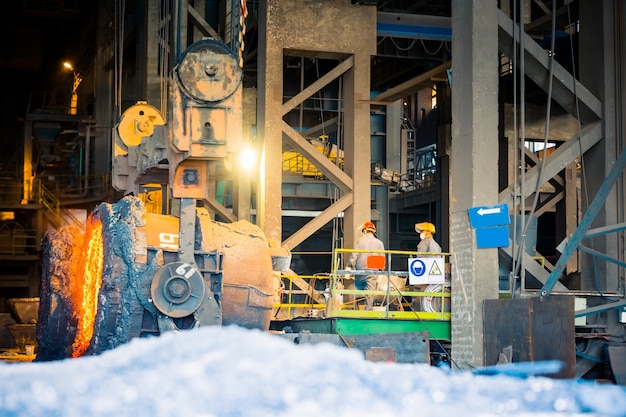
The steel industry will operate at an important strategic point in Brazil during 2025. Insiders and analysts will monitor modern trends in global trade, technological progress, and environmental rules to detect how they transform steel production methods in the country. The forthcoming period differs significantly from the original visions from ten years ago, so industry participants now construct plans with updated perspectives for steel mills in Brazil.
A Landscape Reshaped by Demand, Green Tech, and Global Strategy
The Brazilian steel industry works toward a sustainable business model that combines modern technological development with environmental responsibility. Industrial developments and energy transformations, along with variations in international partnerships, force steel producers to undertake transformational changes that they have never experienced before.
Surge in Local and Global Demand for Steel Mill Brazil
The market for steel demands rise through local infrastructure development projects as well as worldwide customer acquisitions. The growing investment in housing, public works, and renewable energy produces an insatiable demand for both raw steel and end products, which shows no clear signs of decreasing.
Major steel plant in Brazil contracts have been signed between development firms and car manufacturers for sustained steel supply in Brazil. Enhancements made to major hot rolling mills enable manufacturers to fulfill strict structural specifications while increasing their operational speed, thus upholding real-time production requirements. The outlook for high-strength, low-alloy steel grades anticipates their establishment as one of the key market drivers during the next decade, according to numerous analysts.
Steel Mill Brazil operators need to increase their production capacity by more than 10% to fulfill growing market needs. However, they encounter challenges with workforce skills, equipment modernization, and regulatory timing requirements.
Digital Integration Across Steel Production Lines
Industry 4.0 has evolved beyond being a goal since it has become an absolute necessity. Brazilian steel companies have started implementing real-time analytics powered by AI, as well as automated inspection equipment with predictive maintenance capabilities throughout their production processes.
The management of
hot rolling mill operations now uses integrated dashboards and machine-learning systems, which achieve better accuracy and reduce waste production. Brazilian large steel plants that implemented these tools have achieved an 18% rise in their production efficiency.
Edge computing and IoT technologies enable distance-based monitoring so facilities can prevent equipment failures and diminish their emission output. Strategically applied intelligence benefits investors and operators by increasing production while minimizing operational costs.
Green Steel: No Longer Optional for Brazilian Producers
Steel’s manufacturing and marketing operations now greatly depend on environmental factors. Industrial requirements for emissions control, energy review, and environmental fee introduction push steelmakers to change their established steelmaking and rolling practices.
Brazilian industries have begun investigating both hydrogen steel production methods and carbon dioxide trapping systems with significant scientific interest. Some Steel Mill Brazil facilities evaluate low-carbon electric arc furnace technology as part of their current research to replace dated polluting manufacturing operations. TheToPropsitiofor environmental-friendly steel production are two alternative materials between recycled metal scrap combined with sponge iron products.
Brazil faces rising pressure to fulfill the low-carbon requirements established by European and North American market purchasers to continue its status as a major exporting nation. ESG compliance requirements used for trade permits led to green transformation becoming mandatory because companies must survive for business operations.
Regional Expansion and Investment in Steel Infrastructure
The construction of new steel manufacturing facilities is increasing rapidly throughout various
Brazilian states. Both public investors and private financiers are funding Northeast Brazilian expansion projects to enhance its production diversity following past relegation as an unimportant region.
New steel plant in Brazil projects feature superior smelting, casting, and hot rolling mills that optimize their modular design capabilities to produce multiple product formats. These newly built facilities were specially designed to respond to domestic consumption requirements and overseas market orders by creating advanced steel building blocks for wind turbine systems with solar technology alongside electrical vehicle components.
The expansions became faster through tax incentives and logistics updates concentrated near port locations. With the ongoing surge of infrastructure outlays, regional steel companies will gain increased importance in national steel production.
Workforce Evolution: Training for the Next Generation of Steelmakers
The steel industry requires more than modern machinery upgrades to establish durable future standards. Brazil’s steel modernization depends heavily on investment in human resources. Training sessions about digital systems, green technology, and robotic automation are implemented through educational alliances with local universities and technical institutes.
The sector has started attracting younger employees who seek careers in steel based on its modernized direction, which combines creativity with sustainability and international connections. The workforce transformation requires essential AI and machine interface literacy skills that enable workers to integrate their knowledge of engineering and data science with traditional metallurgy practice.
Hot rolling mill facilities see increased company investments in worker safety and retention efforts while improving digital safety protocols and working conditions.
Geopolitical Shifts and Trade Realignments
Trade relationships move forward because exports strengthen their path toward Southeast Asian territories as companies re-establish business relationships with African countries. Expert analysts anticipate Brazil’s steel export volumes will turn toward eastern markets since Western tariffs face adjustments alongside changing political alliances.
The
Steel Mill Brazil operators direct their production standards and quality assessment practices towards global requirements by focusing on ISO certification standards and anti-dumping regulations with global carbon regulations in mind.
Brazilian producers must focus on establishing their steel products as premium choice material for demanding international markets. The coming period will probably lead to additional synchronization between Brazilian output and international specifications.
Challenges Ahead: Energy Costs and Raw Material Volatility
Despite optimism, challenges remain. The ongoing high energy prices create margin challenges primarily for steel companies, which maintain a continuous power supply from traditional non-renewable sources. The volatile nature of iron ore and metallurgical coal negatively impacts both companies’ profit margins and their ability to conduct accurate forecasts.
Producing steel plants in Brazil explore both domestic materials and joint mining projects and storage strategies to protect their operations from supply disruptions. Hot rolling mill operators achieve lean production by testing out short production cycles and recycled energy systems, as well as low-humidity steel processing.
Conclusion
The Steel Mill Brazil operations demonstrate to the world how substantial industries can transform themselves during international development through adaptation. The coming year of 2025 represents a pivotal moment that unites strategic planning with smart technology and sustainability practices. RMT Tools proves its reputation as a trustworthy partner that provides advanced equipment solutions for the future. By leveraging dual priorities of experience and innovation spanning several decades, RMT Tools delivers continued support to steelmakers throughout Brazil and the rest of the world.






